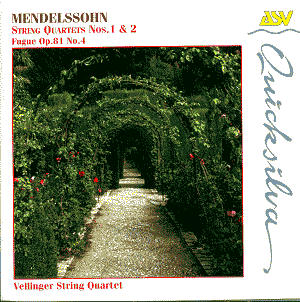The numbering of Mendelssohn's compositions is often
misleading. For example, the present Quartet in A minor is listed as
his Opus 13, but it was composed in 1827, some two years before the
quartet known as Opus 12. At the time he wrote these pieces, the teenage
composer had recently experienced the disappointment of his opera The
Wedding of Camacho failing, and, moreover, he had been saddened
to learn of the death of Beethoven, a figure whom he revered. In this
context it is no wonder, then, that the music has a certain bitter-sweet
quality, in keeping with Mendelssohn's own need for consolation.
In both quartets the music has a clear debt to Beethoven,
and this of course strengthens both the form and the expressive nature
of the music. There are strong grounds for taking the view that the
best of Mendelssohn is to be found in the chamber music, and anyone
wanting to put this contention to the proof could do no better than
investigate this splendid disc, containing performances of both skill
and understanding.
Of the two, the A minor Quartet is perhaps the finer,
though both show the composer at the height of his powers. And what
powers they are, for the young Mendelssohn remains the world's greatest
ever creative prodigy, surpassing even Mozart. In both performances
the Vellingers play immaculately, but also with great expressive freedom.
The attention to detail in matters of dynamic nuance brings much reward
too: this is quartet playing of the highest order.
Here Mendelssohn scores on every count. The melodic
invention is inspired, but the formal command is very strong and the
overall vision is hugely imaginative. Nowhere is this more so than in
the final phase of the Opus 13 Quartet, when the music moves into unexpected
regions, in which the highest praise is to confirm that the vision of
the performance matches that of the music. With a generous and imaginative
'encore' in the form of the surprisingly lyrical Fugue in E flat, this
is a disc to treasure.
Terry Barfoot

![]() Vellinger String Quartet
Vellinger String Quartet
![]() ASV CD QS 6236 [60.48]
ASV CD QS 6236 [60.48]